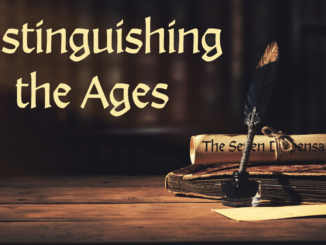
Part 3 of a Study of the Seven Dispensations
After the Dispensation of Innocence and the Dispensation of Conscience, the third dispensation is that of Human (civil) Government, which only lasted 427 years (from the time of the Flood until Abram’s call at the age of 75 years). There are several similarities between the beginning of this dispensation and the Dispensation of Conscience:
- A catastrophe has placed a small group of people in a new environment in which they must make a new life under a new covenant.
- God gave to each the task of replenishing the earth. In other words, they were to fill it up as it had already been in some previous time.
- They had each seen firsthand evidence that sin brings judgment.
- Each knew how to approach God through sacrifice.
But each dispensation brings with it an added revelation of God, and the greater light brings greater responsibility.
But each dispensation brings with it an added revelation of God, and the greater light brings greater responsibility. Noah was 600 years old when he came out of the ark. He knew God’s plan and began this new dispensation in the right way – by building an altar to God and offering burnt offerings (Genesis 8:21-22).
I. New Laws and Conditions
It is as if God said to Noah, “This is your chance to start a better order of things. You can do better if you obey my laws. I will show you how to govern yourselves.”
In the matter of diet, He gave man permission for the first time to do what Jabal had already done, to eat meat as well as vegetables (Genesis 4:20). But there is a restriction. Man is to eat no blood, a reminder that blood is the vehicle of redemption to come. Later, Moses was to link blood with redemption (Numbers 17:11) when he would explain, “For the life of the flesh is in the blood. It is the blood that maketh an atonement for the soul.”
For the life of the flesh is in the blood. It is the blood that maketh an atonement for the soul.
God again gave man dominion over the beasts of the earth, reminding him that he is a higher order of creation.
One of the most significant laws God put into effect under the dispensation of human government was the law of capital punishment as a means of dealing with murderers: “Whoso sheddeth man’s blood, by man shall his blood be shed: for in the image of God made he man” (Genesis 9:6). The law of capital punishment continued under the dispensation of Law: “He that smiteth a man, so that he die, shall surely be put to death” (Exodus 21:12). Paul also affirmed capital punishment in the Dispensation of Grace (Romans 13:4).
The method of human government is in contrast with God’s dealing with Cain under the Dispensation of Conscience. With this new God-given authority of man over a man for the first time is implied the whole range of human government. Other laws were added in this and other dispensations, but this is where human government began.
II. The Noahic Covenant
God made a covenant with Noah and his sons. The essence of the covenant is in Genesis 9:11; “I will establish my covenant with you; neither shall all flesh be cut off any more by the waters of a flood to destroy the earth.” God’s token of the covenant “between me and the earth” was my “bow in the cloud.” Although the bow was already in existence (Ezekiel 1:28), it took on new meaning at this time.
Man needed this reassurance at this time when he was beginning the adventure of human government. God knew by foreknowledge that man would miserably fail in this also, and he began to show His great mercy, which would climax in sending His Son in another dispensation. With the evidence of the Flood still around them, man would naturally wonder if it could happen again, and if so, how soon. So God’s covenant had a special comfort for that generation.
III. Failure
In spite of man’s new beginning, there was soon evidence of failure. Noah, the preacher of righteousness, became drunk and disgraced himself in the eyes of his son. Ham, acting in complete disrespect for his father, also failed (Genesis 9:20-27).
When Noah realized what had happened, he pronounced a curse upon Ham and, prophetically, a blessing upon Shem. The Savior was to come through Shem, and it is a lineage that is traced throughout Genesis. This may account for the fact that he is listed last in the genealogies of Noah’s sons, which are given in chapter 10 of Genesis. He was actually the middle son.
IV. The Tower of Babel
Perhaps out of disbelief of God’s promise that He would not again destroy the earth by water, man still seemed to have a fear that the terror of the flood might be repeated. At least, from some apparently self-preserving instinct, coupled with rebellion, they decided to build a tower, a central meeting place, a symbol of their unity “lest we be scattered abroad upon the face of the whole earth” (Genesis 11:4).
This was the beginning of a centralized government. The Hebrew expression translated, “Let us make us a name” (v.4) shows that open rebellion was involved. As is necessary for all rebellions, there was an agitator, a strong leader. Nimrod was evidently a powerful and evil personality. He was able to rally men around him and dazzle them with his feats of strength.
While Nimrod instigated the building of the tower of Babel, his wife Simeramis led the people into a mystical religion that centered upon her own personality and that of her son, Tammuz, whom she claimed was supernaturally conceived. The tower of Babel was built in the land of Shinar in Mesopotamia, which seems to have been the location of some of the earth’s earliest cities. According to ancient Babylonian descriptions, the tower contained shrines to many gods, so it is the earliest evidence of idolatry. Talbot says that many of the errors and idolatrous practices of the Roman Catholic movement came from Babylon.
The Bible does not tell us that the tower was destroyed, but it does indicate that three important things happened at that time:
- “So the Lord scattered them abroad from thence upon the face of all the earth” (Genesis 11:8). This would make it more difficult for the people to unite in rebellion against God.
- The Lord did “there confound their language, that they may not understand one another’s speech” (Genesis 11:7). This confusion of tongues made it difficult or impossible to communicate for a time. The people had never had to cope with the plurality of languages before. This caused the people to scatter into various groups which understood the same language.
- After the people were scattered over the face of the earth, God set the bounds of their habitations (Acts 17:26), thereby determining the placement of the nations. This could explain how the ancient Indian civilizations of the North and South American continents flourished even before other nations were aware of either the people or the great continents. (See in this connection Genesis 10:5, 32; 11:8; Deut. 32:8).
The evidence of God’s judgment on Babel is with us now in the nearly 4,000 languages and dialects spoken by people today.
We can see on a map of the world that the west coast of Africa and Europe could fit roughly into the eastern coastline of our hemisphere. This would indicate that what was once a very great land mass had at one time been separated by water. Revelation 21:1 further proves that this was a direct judgment on the people since God will do away with it as part of the curse.
The Dispensation of Human Government began with a bright promise as Noah sacrificed to the Lord, “and the Lord smelled a sweet savor …” Now, 427 years later, the dispensation closes in idolatry and rebellion under Nimrod. The evidence of God’s judgment on Babel is with us now in the nearly 4,000 languages and dialects spoken by people today.
Fred Moody (1931 – 2020) pastored for many years and taught at Baptist Bible College in Springfield, MO. He also served as the Dean of Louisiana Baptist Theological Seminary in Shreveport, LA. He held a B.A. from Baptist Bible College, an M.A. from the AG Theological Seminary, an M.Div. from Louisiana Baptist Theological Seminary, and a Ph.D. from the California Graduate School of Theology.
Originally published in the Baptist Bible Tribune, December 1991
Click here to read the Introduction to the Series.
Click here to read The Dispensation of Innocence.
Click here to read The Dispensation of Conscience.

